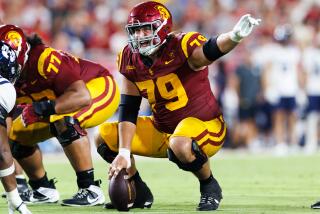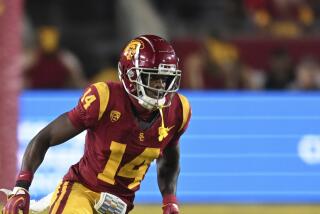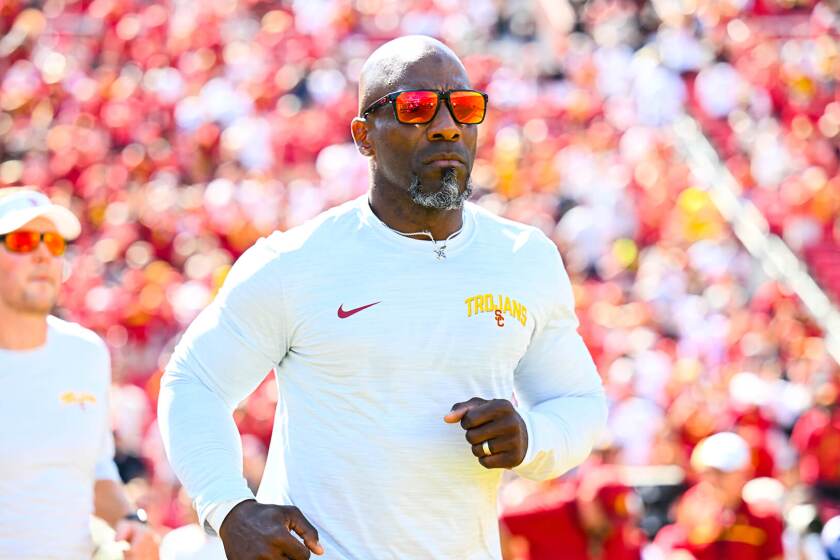Favorite Uncle
- Share via
COPPELL, Texas — Here comes the uncle again. What’s the problem this time?
My nephew’s playing the wrong position. He’s not playing enough. He’s playing too much.
In the rambling suburbs north of Dallas, football coaches from pee-wee league through high school welcomed Emmanuel Moody onto their teams. Those nimble feet, that twitchy acceleration. Then they discovered his physical gifts came with a familial attachment.
His young uncle showed up at practice or asked for meetings that stretched an hour. A self-described “tall, skinny, Korean guy,” he had never played football yet freely offered his opinions.
“Every coach Emmanuel had, I got in some altercation with,” he said.
Michael Chang -- the uncle, not the former tennis player -- could be just as rough on his nephew, meticulous about diet and training, making him run sprints in the Texas summer heat until he vomited. And that was when the boy was in fifth grade.
“My mom had to tell him not to push me so hard,” Moody said.
Not much has changed now that Moody is a freshman at USC and the Trojans’ top rusher heading into Saturday’s game against Washington at the Coliseum. Chang still calls each day, sometimes twice, and checks regularly with the coaching staff.
“Michael is protective of Emmanuel,” said linebackers coach Ken Norton Jr., who recruited the tailback. “Extremely protective.”
Their relationship suggests trouble -- an overbearing authority figure, a beleaguered prodigy. For USC fans, it might even stir memories of troubled quarterback Todd Marinovich and his father, Marv.
But the truth is something very different.
*
The tale begins in St. Petersburg, Fla., where Chang grew up as the only Asian kid in a tough neighborhood. His father died of a stroke when he was young.
“It’s funny because I never had anyone to look up to,” he said in words tinged with a Korean accent. “I had a lot of rough things as a kid.”
He ended up living with his sister, Young Sun, in Dallas. Her ex-husband, Eugene Moody, who was African American, had left her raising three children.
The oldest son and daughter were close to Chang’s age, 14, but Emmanuel was only six. Chang, for all the predictable reasons, took it upon himself to serve as the boy’s father figure.
There were equal measures of empathy and firmness, an emphasis on Christianity. Also, Chang sought to instill toughness. This objective found a new avenue when Moody reached third grade and played pee-wee football.
“The first game I went to, he scored four touchdowns in the first half,” Chang said. “I was like, ‘Wow, this guy is going to be good.’ ”
Thus began the grueling sessions at a high school near their home, across the freeway from Texas Stadium in Irving.
“He had never played football,” Moody said. “But somehow he knew his stuff.”
Said Chang: “Honestly, I didn’t know what I was doing.”
He read books and scoured the Internet. He saw Emmitt Smith working out on television and took note of how the former Cowboys star set plastic cones on the ground, darting around them.
Cone drills became a fixture of their training, as did the sprints that one day left Moody dehydrated and vomiting, needing to be carried off the track.
“I felt bad because I worked him so hard,” Chang said.
But here is a key to their relationship -- Moody liked it, craved it.
Whether it was football or video games or ping-pong, the kid had always been hyper-competitive, hungry to improve. He wanted to be pushed.
“If I didn’t want it,” he said, “I probably would have quit.”
Sure, there were times he complained, even cursed his uncle. Especially when Chang put him on a special diet, eating certain foods five times a day to gain weight.
“He trained me till I was crying,” Moody said. “Made me eat until I was crying.”
Yet, they realized they were headed toward the same point -- together -- after Moody got sick at the track. They knew because the next day ... he wanted to go back.
*
His skin is dark like the father, but his face whispers of the mother’s heritage. Sparse eyebrows and faintly almond-shaped eyes. A squarish face leading into a prominent jaw.
In the realm of football, these Asian features worked against Moody, said Chang, who is more classically Korean in appearance, a light complexion against jet-black hair.
“Everyone has the running back position set in their minds,” he said. “It has to be an African American.”
More to the point, Moody was a late-bloomer, considered too small to carry the load. He was also quiet, not the type to confront.
Chang did it for him.
When coaches pegged him as a cornerback, the uncle argued. Not enough carries? The uncle complained.
“I’m straight with coaches,” he said. “If I don’t think it’s fair, I’ll speak up.”
Which explains another aspect of their bond. Said Moody: “Every kid has to have someone watching out for him. Since my dad wasn’t there, he was the guy.”
The family moved a few miles north to Coppell, a neighborhood of quiet streets and brick houses. Coppell High had a senior running back, one of the best in school history, and asked sophomore Moody to spend a season at receiver. Chang went straight to the coach’s office.
“His uncle came in saying ‘He’s a running back,’ ” Coach Mike Fuller said, adding tersely: “We honored the request.”
They honored it by keeping Moody in the backfield -- on the junior varsity.
But around that time, the young back grew taller and put on 25 pounds. He rose to varsity as a junior, finishing the season with 1,319 yards and 12 touchdowns, numbers that attracted recruiters from Texas, USC and Miami.
Though the Longhorns got a verbal commitment, USC’s Norton refused to back off. He persuaded Moody to visit Los Angeles, picking him up at the airport. The assistant knew of Chang but had never met him.
“Where’s your uncle?” he asked.
Chang was standing right there. It wasn’t the first time a coach had expected someone older, someone different. He said, “I know they look at me like, ‘Who is he? Here’s a young Asian guy. What can he know about sports?’ ”
Norton knew that to sign the nephew, he had to sell the uncle. The best way to hook them both, he surmised, was by flipping what might be considered a typical recruiting approach.
USC has a history of great tailbacks, he told them. The program was pursuing other talented runners such as C.J. Gable and Stafon Johnson.
The question was, could Moody measure up?
“He really wanted that challenge,” Norton said. “That was the lure for him.”
*
Big-time college football is different. Chang swears he understands that. An uncle -- even one who is now 27 and starting a career in management -- can’t go sticking his nose in.
He offers an example.
Last season at Coppell, Moody’s yardage declined as he battled injury. At one point, coaches urged him to play and Chang objected.
“He was good for Emmanuel because Emmanuel needed someone in his corner,” said Fuller, the coach. “The problem we had was that sometimes Emmanuel didn’t trust us and I think that came from his uncle. If he had a hamstring injury or whatever and we’d ask him how he was doing, his uncle’s response was that we were trying to use Emmanuel.”
A similar issue arose during USC training camp this summer when Moody took a particularly hard hit. Chang called Norton to say, “If he has a concussion, I don’t think he should play.”
Norton told him that team doctors had given medical clearance. Chang backed off.
Through August, he continued to call Norton and his nephew, and visited camp several times. But he kept his mouth shut about how many carries Moody was -- or wasn’t -- getting in practice.
The relationship between uncle and nephew was entering a new phase, both of them growing up a little.
“I guess I learned from the past,” Chang said. “It’s not always good for me to call.”
*
Every snap in pee-wee football and every touchdown in high school. Traveling to Arkansas for USC’s opener and to Los Angeles for the Nebraska game, when Moody took over as the starter. Chang was there for every moment his nephew played.
Until now.
Recently married, he skipped the Trojans’ last two games.
At Arizona, Moody gained 130 yards. Last week at Washington State, the going was tougher but he broke a 48-yard run to fuel a crucial second-half drive. Coach Pete Carroll says they should have given him more carries.
Watching on television from his Dallas home, Chang cheered every yard and, at times, nearly broke down crying. His wife asked him what was wrong.
“She didn’t understand,” he said. “I’m so proud.”
It isn’t about stardom or the lure of NFL millions. Looking to the future, Chang and Moody are just as likely to mention Moody’s hopes for becoming a pastor, spreading the word of God.
“I know it sounds corny,” Chang said. “Our religion is very important to us.”
This is the tale of a young man who grew up without a father and vowed not to let the same thing happen to his nephew. It is the tale of a boy who needed someone to look up to.
For now, football is a conduit for that bond.
“He knew I wanted to play,” Moody said of his uncle. “He got me to where I am.”
When they talk after games, it almost always goes the same. They recall various plays, both good and bad, and look to the next game. Always, they agree, there is room for improvement.
*
(BEGIN TEXT OF INFOBOX)
Rush job
USC freshman running back Emmanuel Moody is averaging 7.3 yards per carry and 81.8 yards per game. His game-by-game rushing statistics:
*--* Date Opp. Att. Yards TDs Sept. 2 vs. Arkansas 7 58 1 Sept. 16 vs. Nebraska 9 70 0 Sept. 23 vs. Arizona 21 130 1 Sept. 30 vs. Wash. State 8 69 0 Totals 45 327 2
*--*
*
SATURDAY’S GAME
No. 3 USC (4-0) vs. Washington (4-1)
Coliseum, 12:30 p.m., FSN Prime Ticket
More to Read
Go beyond the scoreboard
Get the latest on L.A.'s teams in the daily Sports Report newsletter.
You may occasionally receive promotional content from the Los Angeles Times.







